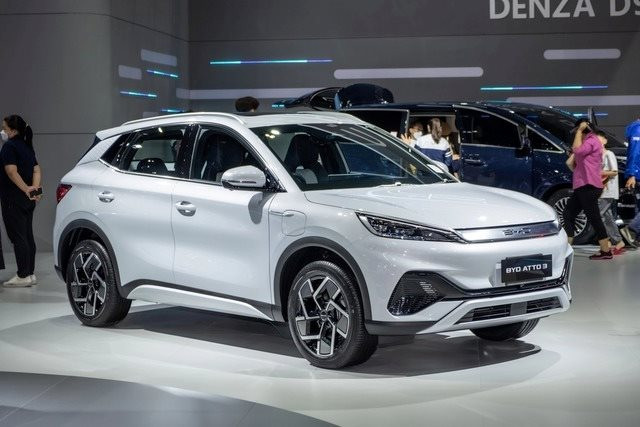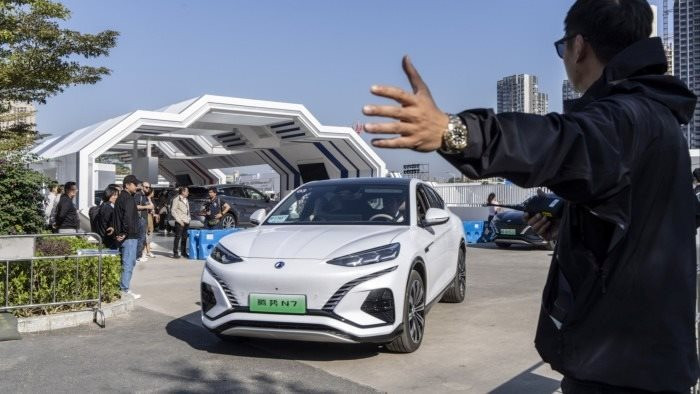BYD plans to nearly double its sales in Singapore and the Philippines as the company aims for strong expansion in ASEAN after its recent launch in the Indonesian market.
According to James Ng, the CEO in charge of these two markets, BYD wants to open more than a dozen car-only stores this year in Singapore and the Philippines.
Strong push in the Singapore and Philippine markets
“If you look at the ASEAN market, in terms of culture it is very close to Chinese culture,” Ng told Nikkei Asia. “So basically, any product we produce, ASEAN consumers show recognition for BYD.”
In mid-January, the manufacturer launched three passenger car models in Indonesia, including the Seal sedan, Atto 3 SUV, and Dolphin hatchback, at a launch event in Jakarta.

Atto 3 – one of BYD’s flagship models today.
In Singapore and the Philippines, BYD is working with local distributors to sell electric cars. Ng said the group has teamed up with Sime Darby Motors and Ayala Corporation of the Philippines to develop a car sales network. Ayala signed an agreement last year to sell electric cars for BYD. Their automotive division, AC Motors, is expected to handle the sale and maintenance of BYD electric vehicles.
In the Philippines, Ng said BYD has more than 10 dealerships and is looking to add over 20 sales points this year. In Singapore, BYD plans to open 2-3 more stores, up from the current 7 stores, including showrooms and cafes where customers can eat and buy BYD products.
BYD has been present in Singapore for over a decade and recently made efforts to enhance its reputation with local customers. In August 2023, the company opened a cafe and showroom in a shopping center – right next to Tesla’s showroom. According to officials, the number of electric cars in Singapore is increasing, with more than 18% of new car registrations being electric cars, five times the level in 2021.
The figures also show that BYD registered about 1,400 cars last year, nearly double the number of 780 cars in 2022. BYD also became the number one electric car brand here last year, surpassing Tesla’s figure of 940 cars.
“BYD is now number one,” said Roger Chan, CEO of BYD Singapore. “That’s definitely good for BYD and for Singapore.”
What are BYD’s plans in Vietnam?
2023 is the year that many Chinese car manufacturers are entering or preparing to enter Vietnam with a focus on electric cars. BYD is also not left out of this trend. There have been a number of reports about the company’s plans to officially enter the Vietnamese market, and even to directly establish production facilities in the country. However, all of this is currently only at the rumor stage.
In July 2023, the BYD Auto Vietnam fanpage on various social media platforms simultaneously posted images of the Atto 3 model with the caption “We are coming”. However, since then, there have been no further updates on how the company plans to approach the Vietnamese market.
The Atto 3 is one of the flagship electric car models from BYD in many markets. For example, in Thailand, in just over 3 months from late 2022 to early 2023, the BYD Atto achieved cumulative sales of 12,000 units, consistently ranking as the best-selling electric car.
In Thailand, the BYD Atto 3 comes in 2 versions: Standard Range and Extended Range, with prices equivalent to 742 and 810 million VND. In terms of size, this model is slightly smaller than the VinFast VF 7.
Earlier, during a visit to Vietnam, Wang Chuanfu, Chairman of BYD, expressed hope that Vietnam would “create favorable conditions” for the company to complete investment and electric car production procedures. There are rumors that the company plans to establish a local supply chain.

BYD will build a factory with a capacity of 150,000 cars per year in Indonesia.
However, according to recent information from Indonesia, the company announced plans to build a second electric car factory in ASEAN, with Indonesia being the chosen location. This announcement comes after the company’s official entry into the market. The company’s plan is to invest over $1.3 billion in this project, starting in 2024.
So basically, up to this point, the presence of BYD electric cars in the Vietnamese market is unclear, except for a few teasers. It is very possible that this is just a few “exploratory” moves by the world’s largest electric car company, before taking specific steps for the Vietnamese market.

![[Photo Essay]: Experts, Managers, and Businesses Unite to Forge a Path Towards Sustainable Green Industry](https://xe.today/wp-content/uploads/2025/07/z678592918-218x150.jpg)


![[Photo Essay]: Experts, Managers, and Businesses Unite to Forge a Path Towards Sustainable Green Industry](https://xe.today/wp-content/uploads/2025/07/z678592918-150x150.jpg)


![[Photo Essay]: Experts, Managers, and Businesses Unite to Forge a Path Towards Sustainable Green Industry](https://xe.today/wp-content/uploads/2025/07/z678592918-100x70.jpg)




